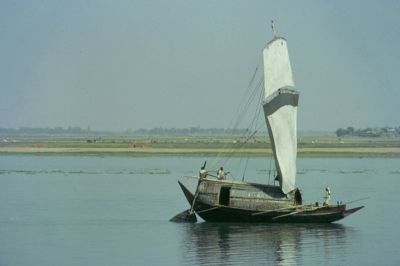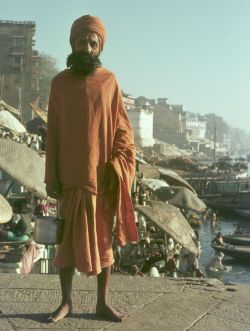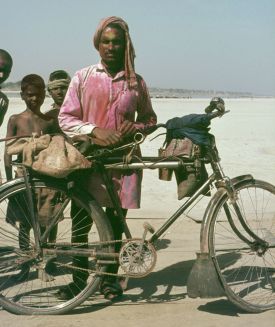| Barelds - Cycling around the world - Cycle stories - Asia, Africa, Europe, America | ||||||||||||||||||||
| home | site map | world | children | recent | cooking | dutch | german | react | ||||||||||||
South-East Asia 1968 (4).

Bangla Desh (then still called East-Pakistan): A vast delta with enormous wide rivers on which traditional sailboats were sailing.
U
nfortunately we don't leave Thailand by road, but through the air. Burma, the neighbouring country, does not allow travellers, only 24 hours in the capital Rangoon. Hardly enough to experience a little of the country: a magnificent Buddhist pagoda, fairylike lit in the evening light, empty colonial boulevards and lanes and delicious meals at a woman who has a shop by the road. On the Chittagong airport - just across the border in Bangladesh, we pick up our bicycles again and enter a totally different continent.Tourist, tourist, tourist" from far and wide people run up us. " Are you a stranger, sir", they asked superfluously: tall, white and shorts. When Henny cycled a short distance in front of me, I could not go any further ; the people he passed were petrified, and were deaf to my bell, because bicycle bells jingle continually in the street bustle.

India : a holy man in the holy city Varanasi on the holy river Ganges.
When we entered a small rural village a few people were strolling in the street, but when we left the village, the street was swarming with people. In the teahouse every movement we made was followed by hundreds of black eyes. In the room replete with people - the landlord could not serve us anymore, and so the cups were passed on from hand to hand . We drank our tea and ate our pancake. The cups went back in the same way, then we received letter: " Dear guest do you wish something else?." to ask for the next order.

India: Paint poured all over this man during the feast of caste fraternisation: Holi festival.
After two bites of rice he curtain was pulled open forcefully. We, angry, "What do you want?". "To look at you, you are strangers, isn't it?", it sounded truly surprised.
In order to sleep on our way we discovered the system of dakbungalows. Actually, they were meant for civil servants, but after a little effort we mostly managed to get permission to stay. Easy, everything ground floor, and you could simply ride into the room with your bicycle. There were no window panes, just a large kind of louver blinds which you could easily open and close. You could retreat comfortably in a room of your own, you drop down tired, and what do you see: between each wooden blade a pair of dark eyes, below those of the children, higher up those of the adults and that from three sides of the room ! In short, there is no privacy in this country. Although Bangladesh is the most densely populated country in the world with numerous majestic rivers crossing the country, the villages - mostly built on mounds - were very little and scattered. In between a completely flat country side with vast fields, as in the Netherlands riding on a dike we could relax, freed from all too great inquisitiveness.
We overtook a rickshaw rider: which is easy enough, terribly slowly such a cyclist toils with his heavy load. Henny rode beside him for a while. "Where are you going to?" he asked. "Feni" was the answer.
That was 10 km further on. "How much does your passenger pay you?" "Five rupees". "That is not much, in Chittagong you have to pay much more".
Immediately the rickshaw cyclist turned around, he did not want to ride any further and started to discuss the fare with his passenger. We did not wait to hear the result.
| World around (nl) | South-East Asia | << Previous | Next page >> | |||
| Barelds on bicycle through the world - Cycling in Asia, Europe, Africa, America | ||||||